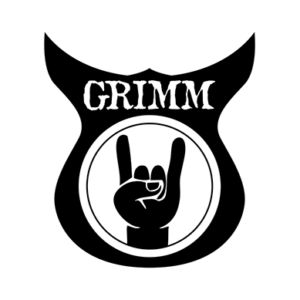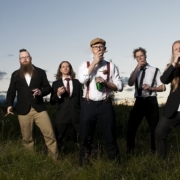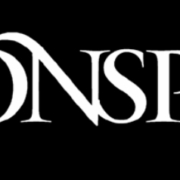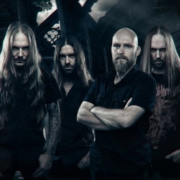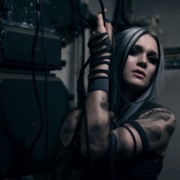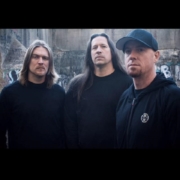[tabby title=”Nederlands”]
Amenra en hun aanhang lieten zich gelden vrijdag op Graspop Metal Meeting 2017 en GRIMM GENT kreeg de kans om met zanger Colin H. van Eeckhout te praten achter de schermen.
Korte biografie: Na het uiteenvallen van de H8000-hardcoreband Spineless richtten zanger Colin H van Eeckhout, gitarist Mathieu Vandekerckhove en bassist Kristof Mondy een nieuwe band op. Met Amenra wilde het trio intensere en meer introspectieve muziek brengen. Drummer Bjorn Lebon kwam bij de band en in 2003 bracht Amenra hun eerste album “Mass I” uit.
Terwijl Amenra experimenteerde met zowel de bandsamenstelling als hun sound kwam rond 2003 gitarist Vincent Tetaert bij de groep. In deze periode schreef de band ook “Mass II” (2004) en “Mass III” (2005). Met hun steeds imposanter wordende optredens – waarbij met videoprojecties en rituelen werd geëxperimenteerd – passeerde Amenra op heel wat Belgische festivals, gevolgd door een eerste tournee in Amerika.
Naast het vinden van een eigen sound, begon Amenra ook steeds meer tijd te spenderen aan de omkadering van hun muziek. Dit niet alleen door het uitbouwen van een eigenzinnige liveshow, maar ook onder meer door het oprichten van de Church of Ra, een collectief van gelijkgestemden. Vaak zijn dit vrienden-kunstenaars die de werkwijze en thematiek van de band delen.
Jullie bandnaam combineert Amen (Katholiek) met Ra (Egyptische Zonnegod). Vanwaar het samenbrengen van monotheïsme en polytheïsme?
We willen het leven bezingen, maar ook zijn duistere kanten. Toen we een naam wilde bedenken kwamen we bij deze twee uit. De symbolen en de symboliek van de kerk en de Egyptische god spraken ons aan.
Hoe past voor jullie sludge/postmetal in dit plaatje?
Dit is niet bewust gekozen. Het is niet echt sludge metal dat wij ook gebruiken, maar wel een onderdeel ervan. De trage en zware stukken passen beter in onze muziek in plaats van de rappe stukken. Niemand van ons was echt op de hoogte vroeger van doom metal, wij kwamen uit de hardcore. Het trager schreeuwen en het trager gitaarspelen viel bij ons in de smaak. In het begin probeerden we gewoon maar wat en liepen we soms vaak verloren, maar we hebben ons ding ervan gemaakt.
Jullie zijn gestart in 1999 en het 1ste album kwam uit in 2003. Hoe komt het dat er 4 jaar zijn overgegaan om werk de wereld in te sturen?
Ik weet zelf niet meer wanneer we onze eerste plaat gemaakt hebben. Ik denk dat we voor onze eerste plaat wel al twee jaar ongeveer aan het schrijven waren. Het was ook een tumultueuze periode uit mijn leven op dat moment. We nemen ook liever onze tijd met alles, wij werken niet graag rond deadlines.
We moesten van een paar fans uit GRIMM GENT vragen wanneer Mass VI uitkomt.
Mass VI komt uit in oktober, de releaseshow is op 31 oktober.
Jullie albums zijn door verschillende labels uitgebracht. Is dit een bewuste keuze geweest?
Meestal zijn dat mensen waar we op dat ogenblik contact mee hebben. We wisten wel al een beetje zelf hoe we platen en albums moeten uitbrengen. Maar we willen ons eigen merk of stempel daarop drukken in plaats van u aan de regels van de uitgevers te houden. We zoeken mensen die ons inspireren en zo komen we bij de verschillende labels uit. We voeren graag een gesprek met die mensen en houden het graag lokaal. Onze eigenheid behouden en hoe dichter bij huis, dat is dankbaarder.
In welke setting spelen jullie het liefst? kleinere podia, kerken, grote podia, festivalweides, …
De kleinere podia of ontwijde kerken zoals Monasterium Poortackere in Gent zijn onze niche. Maar je moet de grote podiums ook mee hebben. Het is ook indrukwekkend om zo’n massa volk te zien op een festival dat speciaal komt luisteren naar onze muziek.
Een GRIMM vrijwilliger die ook aanwezig was op jullie optreden in de Vooruit in Gent wou jullie volgende vraag stellen: ‘Jullie muziek is ook ontstaan uit een soort van verwerkingsproces van jouw kant, uit verdriet door het verlies van je vader. Als je merkt dat een hele zaal in volle overtuiging zich laten meeslepen in dit verdriet en zich volledig geven tijdens jullie liveshows. Wat doet dat me jou? Welk gevoel heb je hierbij?
Dat is een zotte constatatie. Op het podium merken we dat meestal niet direct. Ik sta ook vaak met mijn rug naar het publiek. Maar in persoonlijke mails naar ons beschrijven sommige fans hun hele leven en dat onze muziek een steun voor hen is of hen erdoor heeft doorgeholpen. En dat is wel enorm zot om te constateren dat je dat teweegbrengt. Het is in de eerste plaats een interpretatie van mezelf en dat doet iets met mij, maar je denkt niet automatisch dat dit bij iemand anders ook die emoties kan losmaken.
Voor jullie het podium betreden, hebben jullie een ritueel?
We hebben geen pseudo kring momenten. Wat we wel doen is elkaar een beetje gerust laten vooraf, omdat we voor een show zowat serieuzer worden ter voorbereiding van het optreden en dan is er weinig ruimte voor bullshit bij ons. Ikzelf luister meestal vooraf wel nog eens naar onze muziek om erin te komen.
Jullie werken met de Church of Ra met veel verschillende artiesten samen (bvb Syndrome, Hessian, Oathbreaker, …), waarom deze samenwerkingsverbanden?
Dat is ontstaan uit een heel netwerk van vrienden die zo de samenwerkingsverbanden voeden. Na een tijdje beseften we ook dat Amenra groter is dan alleen muziek maken en we konden het ook niet meer alleen aan. En die groep had een bepaalde benaming nodig, zo zijn we bij Church of Ra uitgekomen. Iedereen werkt ook keihard in zijn eigen niche en iedereen helpt elkaar om de verschillende onderdelen aan elkaar te koppelen. Church of Ra is een netwerk.
Bedankt voor dit korte interview Colin!
[tabby title=”English”]
Amenra and their followers let themselves be seen at Graspop Metal Meeting 2017 and GRIMM Gent got the opportunity to go behind the scenes to have a talk with vocalist Colin H. van Eeckhout.
A short biography: After the split-up of the H8000-hardcore band Spineless, vocalist Colin H van Eeckhout, guitarist Mathieu Vandekerckhove and bassist Kristof Mondy started a new band. With Amenra the trio wanted to bring more intense and introspective music. Drummer Bjorn Lebon joined the band and in 2003 Amenra released their first album “Mass I”.
While Amenra was experimenting with both the band line-up and their sound, in 2003 guitarist Vincent Tetaert joined the band. In this period the band wrote “Mass II” (2004) and “Mass III” (2005). With their more and more imposing shows – in which they experiment with videos and rituals – Amenra shows up at a lot of Belgian festivals, followed by a first tour in the States..
Besides finding their own sound, Amenra also started to spend more time on framing their music. Not only by building an out-of-the-box live show, but also by starting the Church of Ra, a collective of equal minded. Most of the time these are friends-artists who share the same mindset and theme of the band.
Your band name combines Amen (Catholicism) with Ra (Egyptian sun god). What’s your reasoning for bringing monotheism and polytheism together?
We wanted to praise live, but including its dark sides. When we were trying to come up with a name, we arrived to these two. The symbols and symbolism of the Church and the Egyptian god spoke to us.
How did sludge/post-metal fit into the picture for you guys?
We didn’t chose that consciously. It’s not really sludge metal that we use as well, but rather a part of it. The slow and heavy parts fit in better with our music instead of more fast parts. No one in the band was really familiar with doom metal in the past, we came from the hardcore scene. The slower screaming and guitar playing was to our liking. In the beginning we just tried something and sometimes got lost a bit, but we made our thing of it.
The band was started in 1999 and the 1st album was released in 2003. What caused it taking 4 years before you were able to send your work in the world?
I don’t even remember when we made our first record. I think that we had been writing already for 2 years on our first record. It was also a very tumultuous period in my life at the time. And besides, we like to take our time with everything, we’re not too good working with deadlines.
We had to ask of a few fans from GRIMM Gent when Mass VI is getting released.
Mass VI is getting released in October, the release show is on October 31st.
Your records have been released through several labels. Has that been a conscious choice?
Most of the time they’re the people we’re having contact with at the time. We already knew a bit ourselves how we should release records. But we want to put our own brand or mark on them instead of having to follow the rules of the publishers. We look for people who inspire us and that way we end up with several labels. We like to have a conversation with those people and keep it local. Keeping our individuality and the closer at home, the more rewarding.
In what setting do you prefer to play? Smaller stages, churches, big stages, festivals,…
The smaller stages or abandoned churches like Monasterium Poortackere in Gent are our niche. But you have to take the big stages as well. It’s also impressive to see a big gathering of people at a festival who especially come to listen to our music.
A GRIMM volunteer who was at your show in the Vooruit in Gent wanted to ask you the following question: ‘Your music has been created from sort of a process of processing, from sadness because of losing your father. When you notice that a complete venue let themselves be dragged along in this sadness and completely surrender themselves to your live shows. What does that with you? What feeling do you get with that?’
That is a crazy realization. On stage we usually don’t really immediately notice. I’m also often with my back turned to the crowd. But in personal mails to us some fans describe their whole life and that our music is something of a support for them or helped them through hard times. And it’s really crazy to realize that you’re causing such. It’s an interpretation of myself to start with and that does something for me, but you don’t automatically think that it would bring up the same emotions with someone else as well.
Do you guys have a ritual before mounting the stage?
We don’t have those pseudo circle moments. Something we do is leaving each other to themselves for a bit before, because we try to get in a more serious mindset as a preparation for the show and then there’s not much room for bullshit with us. Personally, most of the time I listen to our music shortly to get more into it.
With the Church of Ra you work with a lot of different artists (e.a. Syndrome, Hessian, Oathbreaker,…), why all of those collaborations?
That started from a network of friends who fed the collaborations. After awhile we also realized that Amenra is bigger than just making music and besides, we couldn’t handle everything on our own anymore. And that group needed a name, so that’s how we ended up with Church of Ra. Everyone work really hard in their own niche and help each other to connect all the different components with each other. Church of Ra is a network.
Thanks a lot for this short talk, Colin!
[tabbyending]
